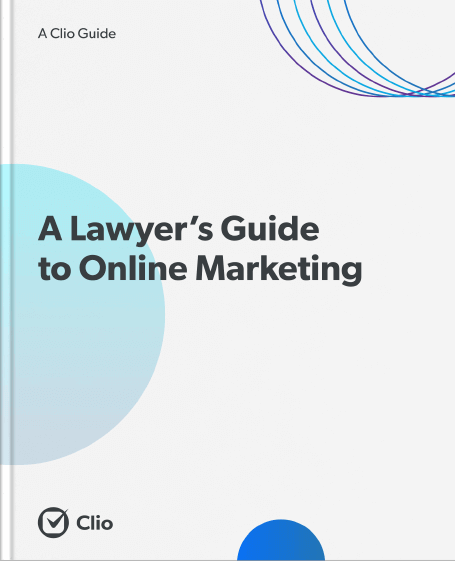As an attorney, you’re paid to be an excellent communicator. But are you as effective when it comes to social media marketing for law firms?
When deciding how to promote your law firm, it can be easy to overlook the enormous power of social media. The prospect of continually sending tweets, likes, and shares—not to mention monitor engagement—can feel overly time-consuming at first glance. Many lawyers sidestep social media altogether because of it.
Doing so could be a big mistake for your business.
In this comprehensive guide to social media for law firms, we’ve done the research for you. From a step-by-step guide on the use of social media, via an in-depth look at Facebook and other platforms, we’ll cover everything you need to know to succeed with social media marketing for law firms.
Let’s begin with a good question.
Why embrace social media marketing for law firms?
In today’s digital age, there’s no getting around it: your competitors and colleagues use social media. If you want to stay current with your audience, you also need to get involved with various platforms. Social media is also a great tool for your firm’s public relations strategies.
Here’s why.
Social media marketing gets you new clients
Social networking provides exposure to a large audience.
As ABA’s 2018 Survey reported, 35% of those surveyed who use social media channels for professional purposes have gained clients. The result is even better for small firms: with 42% gaining new clients through social media marketing.
Social media gives clients another way to find your law firm
Social media profiles can drive people to your law firm’s website—where potential clients can find the information they need to hire your firm. It’s a tactic that consumer brands have perfected.
For example, the path from seeing you on social media to hiring your firm might look like this:
- You share a blog post you wrote about how newly married couples should structure their wills on Facebook.
- Prospective clients see the Facebook post and click on the link to read it on your website, where you’ve added an online intake form using Clio Grow’s custom intake form tool.
- The potential client completes the online intake form and leaves their email address.
- The client then automatically appears in your Clio Lead Inbox.
Social media is a place to engage with the community
Lawyers can also use social media to build their profile within the legal community.
By participating in social networks with other attorneys, you can stay up-to-date on what’s trending in your legal community. Better yet, you can offer your own commentary to boost your thought leadership.
Below are a few examples of groups to join on LinkedIn:

How many law firms use social media?
Clearly, social media comes with an array of powerful benefits. This raises the question: how many law firms are harnessing the potential of social media?
According to the 2023 ABA TechReport, 84% of respondents indicate that their firms maintain a presence in social networks. By contrast, only 16% indicate that they don’t have a digital presence.
Should law firms use AI for social media?
AI can be a powerful tool for law firms when used wisely. It can help with generating content ideas, writing draft captions, or scheduling posts—saving valuable time. However, it’s important to thoroughly review and edit AI-generated content to avoid legal inaccuracies or compliance issues. Always ensure the tone and information align with your firm’s ethics and brand standards.
How to market a law firm on social media
The value of social media for law firms is clear—but in order to get an adequate ROI, you need a plan.
While your individual plan should be unique to you, your practice areas, and your audience, the following best practices can be used to get your social media on the right track.
Step 1: Know the rules
Make sure you know the rules and responsibilities lawyers have on social media in your jurisdiction before making an account for yourself or your law firm.
Check out the law society and bar rules for compliance responsibilities and ethics regulations, and be sure you know them before you post or share anything. Many states prohibit lawyers from using terms like ‘expert’ or ‘specialist’ to describe themselves.
Additional information about ethically dealing with social media can be found here.
Step 2: Identify your goals
Next, ask yourself: What do you hope to gain from social media?
You’ll want to achieve a clear understanding of your objectives in using social media marketing for your law firm. These may include:
- Gaining more clients
- Building brand awareness
- Increasing website visitation
Make realistic and attainable short-term and long-term goals for your professional social media. Once you know what you’re looking for, you can use those goals to guide your social media marketing.
Step 3: Do your research
Check out what competitors are doing in your practice area and how they use social media differently. Identify what works for them, and what’s likely to be a dealbreaker for prospective clients.
If you want to know what other legal influencers are up to, follow them, share their content, and engage in their online communities.
Step 4: Start small
While it can be exciting to jump in and try out a bunch of social media platforms at once, you might be doing yourself a disservice.
By starting too many social accounts, you’re more likely to get overwhelmed and not be able to dedicate the proper time and attention to each of them.
This can lead to potential ethics violations or abandoned social accounts, which does your firm more harm than good.
Step 5: Consider your content
Plan what type of content you’ll be posting to your social media accounts.
Whether you want to develop new content to post as part of your marketing plan, share existing content, or your plan is to focus on engaging with people in comments—it’s a good idea to think about what your target audience expects as you plan your strategy.
Content creation ideas for your law firm
Content for law firms should both inform and build credibility. You can repurpose common client questions into blogs, carousels, or short video posts. Try using infographics for timelines or legal checklists, or create content around seasonal legal topics like taxes or wills. Sharing case studies, legal tips, and interactive elements like quizzes or polls helps engage followers and showcases your expertise in an accessible way.
Step 6: Set a schedule

Consider creating a content calendar and using social media tools like Hootsuite.
By pre-planning when you’ll release your content, you remove the stress of trying to think of what to post in the moment. Additionally, this time for review before posting can also be helpful in reducing your risk of accidentally violating ethics rules or client confidentiality in a rush to post.
You’ll also be more consistent in your posting if you schedule it in advance—allowing you to maintain a social media presence, and increase engagement with your audience.
Step 7: Measure your results
As with any type of law firm marketing, it’s imperative that you track, measure, and evaluate the results of your social media efforts if you want to be effective.
Law firms that fail to track which content is most effective are at risk of wasting their efforts and budget on the wrong materials.
Best social media platforms for law firms
With a powerful crop of social media channels to choose from, it’s worth knowing the basics and refreshing yourself on what’s new before you invest the time in maintaining a profile.
Some networks may be better suited to you or your firm than others, depending on factors such as:
- Your practice area
- Target audience
- The type of content you’d like to post
For example, Facebook and LinkedIn have a different target audience, and you’ll rarely share users the same content across both social media platforms.

With 2.96-billion monthly active users, Facebook is the most popular social media platform in the world. It’s also popular among legal professionals, with 40% of firms indicating they maintain a presence on the platform, according to the 2023 ABA TechReport.
While Facebook offers vast reach, its algorithms prioritize friends-and-family posts in the News Feed, making it challenging for law firm content to gain visibility.
What should lawyers post on Facebook?
Lawyers should use Facebook to build trust and stay top-of-mind by sharing legal tips, case updates, client testimonials, educational videos, industry news, and insights on common legal issues. Engaging content like FAQs, community involvement, and behind-the-scenes firm updates can also help build trust and attract leads. Keep it clear, professional, and aligned with your firm’s values.
If your efforts on Facebook aren’t being seen by your target audience, they’re wasting your time.

LinkedIn remains the most popular social media platform for lawyers in the US, according to the ABA’s 2023 TechReport. More law firms use LinkedIn than every other platform, even Facebook—with 69.2% of respondents indicating their law firm maintains a presence on the channel.
So, why is LinkedIn the most popular form of social media for lawyers?
It’s made for business.
LinkedIn is designed to promote your professional persona and build connections with others in the legal industry, which can be useful for gaining referrals.
It’s important to ensure your LinkedIn profile is an effective reflection of you and your firm.
A few tips for a better LinkedIn profile?
- Keep things professional. Use professional photos as your profile picture.
- Be compelling. Take time to write a clear headline, concise summary, and meaningful descriptions of your relevant law firm experiences. If you find it difficult to write about yourself, consider hiring a professional writer to help with your profile.
- Stay relevant. Curate your profile to showcase career highlights that are most relevant to your current practice, focus, and goals, so visitors to your page can easily learn about the attorney you are today.
In addition to using LinkedIn for you as a professional, you can also create a LinkedIn page for your law firm to enhance its persona online (this guide to law firm LinkedIn pages can help).
X
X is a slightly less common social media platform for law firms—with 30% of firms indicating that they maintain a presence on it. But it does offer some unique benefits for busy legal professionals:
- It’s concise. As a microblogging social media platform, X limits your tweets to a character count of 280—forcing you to stay succinct.
- It’s efficient. As a result, when scrolling your feed, you can consume highlights and headlines for a wide range of issues in a short period.
- It’s instantaneous. X gives you near-instant updates on news and information you need to know.
If you’re just starting out on X, be sure to follow influential people in your industry—both as a source of social media inspiration and as a way to stay engaged with people that share content about the issues that are important to you and your audience.
YouTube

Though it’s a less common choice for lawyers and law firms, a YouTube channel gives you the opportunity to share video content with subscribers. Video makes it easy to showcase your personality to viewers, helping them feel like they “know you” before they’ve met you—which can make potential clients feel more comfortable.
Law firm marketing video ideas
Video content is one of the most effective ways for law firms to connect with their audience. Create explainer videos that walk through legal processes, share real client success stories (with permission), or bust common legal myths. You can also show behind-the-scenes footage of your day-to-day operations or your involvement in the community. Don’t forget quick tip videos on legal topics—these work great as reels, YouTube shorts, or TikToks and position you as a helpful authority.
However, before creating YouTube videos for your firm, ensure that:
- You’re able to make high-quality content. Your production, titles, video quality, and lighting should all look clean and professional.
- You have a strong on-camera presence. If you’re creating videos where you speak to the camera, you should be comfortable being on camera.
- You have something to say. Videos are a great opportunity to convey authority, but be sure your content is interesting (and that it follows ethics rules and guidelines).

Instagram, which is owned by Facebook, is image-and video-centered. This may make it a less than ideal fit for your firm.
Yet, for those in consumer-focused areas of law, like personal injury, it’s a great way to connect on an individual level. For larger firms focused on business clients, Instagram might be better suited to marketing yourself as a great place to work to attract top talent.
For many lawyers, Instagram is the platform to use in order to humanize yourself and your firm. Posting content related to your lifestyle, work in the community, and firm life can showcase a positive persona.
How to market your law firm on Instagram?
- Make your content easy to find. Use hashtags and location tagging when appropriate (for example, you can location tag yourself in your office.)
- Post high-quality photos. Be sure to convey a polished, professional image.
- Be careful not to violate ethics guidelines. And, never accidentally break confidentiality with your client’s information (for example, don’t post a behind-the-scenes image of your office where client documents are visible on your computer screen).
TikTok

This brings us to our final social media channel for law firms: TikTok. This increasingly popular platform allows users to create and share short videos with their audience. And it’s taken the world by storm in recent years, with some 1 billion monthly active users.
TikTok has one of the most engaged audiences, which presents an opportunity for law firms and attorneys to expand their reach. Many lawyers use “LawTok”—a segment of TikTok that focuses on legal content—to promote their firm.
So, how can you use TikTok to connect with clients? Here are a few tips.
- Be compelling. Ensure you’re creating useful content that provides value to your audience. One idea? Read comments on LawTok videos to see if there are unanswered comments or requests you could make content for.
- Be consistent. Aim to have a regular schedule, whether it’s weekly, biweekly, or monthly.
- Embrace hashtags. Hashtags are important for grouping content on TikTok. Remember to use #lawtok, as well as your own niche hashtags such as #familylaw or #employmentlaw.
- Follow the trends. TikTok is unique in that copying another account’s content is actually encouraged. So, see what other law firms are doing and make it your own. Even better, use what TikTok calls a “duet” feature to react to their content.
Bluesky
Bluesky is a new decentralized social media platform gaining traction among professionals. Though still in its early stages, it offers a fresh alternative for lawyers looking to expand their online presence without the clutter of traditional networks. Its algorithm prioritizes user control and transparency, making it appealing for those who value privacy and content ownership.
So, how can law firms use Bluesky?
- Thought leadership: Share insights and legal updates to position yourself as an expert.
- Networking: Connect with early adopters, tech-savvy professionals, and peers.
- Community engagement: Join discussions relevant to your practice area and build a following in niche legal communities.
Keep an eye on Bluesky’s growth—it could become a valuable channel for forward-thinking law firms.
Interested in learning more about Bluesky? This social media platform is taking off in the legal sector, learn more and find the best legal profiles to follow.
Final thoughts on social media for attorneys and law firms
When building a law firm marketing strategy, effective social media management is crucial. Set goals, make a plan, and stick to it—by being consistent and active on social media, you’re more likely to engage with your target audience and increase your law firm’s business.
Also, it’s important to respect the nuances of each network by adapting how you use social media for each audience. Content that was well received on Facebook might not have the same success when reposted on Twitter or Instagram. Each network deserves its own strategies, otherwise, your social media marketing efforts won’t reach their maximum potential.
If you need help managing the social media accounts for your business, consider reaching out to an expert who can take a look at your firm and get started with building an effective social media presence.
Interested in learning more about digital marketing for law firms? Discover our guide covering everything you need to know about marketing your firm online.
Law firm marketing experts share their top tips - for free
Get law firm marketing tips from experts Gyi Tsakalakis, Josh King, and Kevin O'Keefe in our free ebook.
Get the Guide



